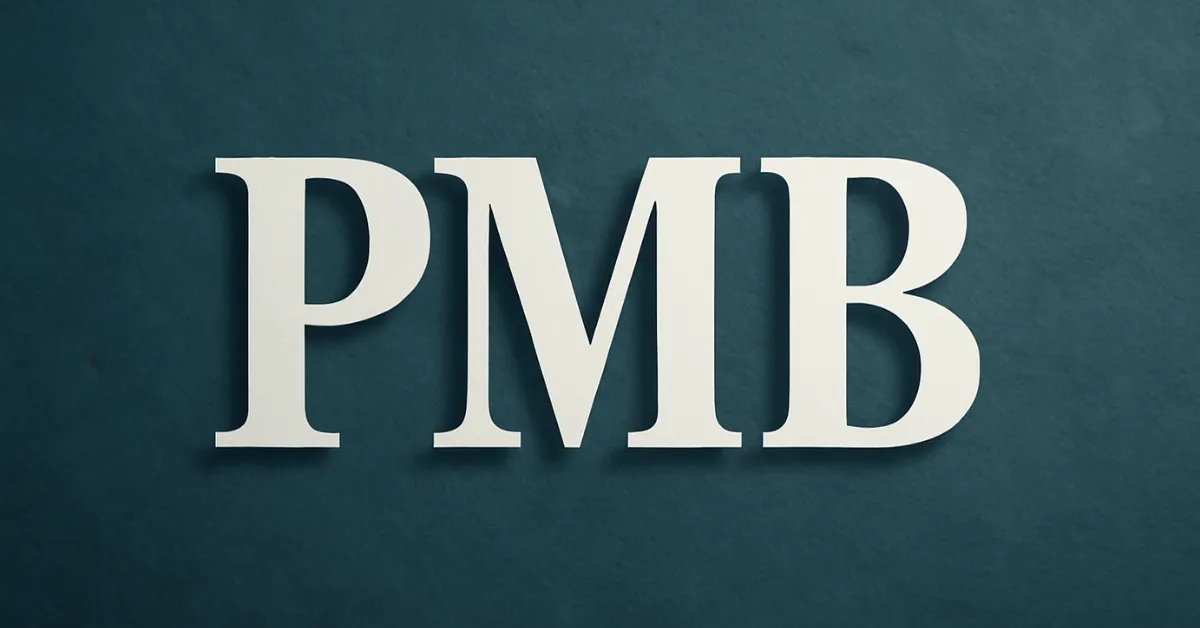The Importance of Contact Information for Business and Personal Use
Finding the right contact information can be a hassle, whether you’re trying to reach a business or connect with someone personally. For many, missing or unclear contact details lead to frustration and missed opportunities.
The solution is easy: keep your contact information clear and easy to find. Whether it’s your email, phone number, or social media, having up-to-date details helps improve communication and builds trust with your audience.
What is Contact Information?
Contact information generally includes details like your name, phone number, email address, and sometimes a physical address. It’s the information needed to get in touch with someone, whether for personal or business purposes.
This information is commonly found on websites, business cards, and social media profiles. For businesses, it is especially important to maintain accurate and easily accessible contact details to improve customer engagement and build trust.
When you look up contact information, you typically find it on an individual’s or company’s website, business cards, or through online directories. It allows people to reach out for queries, offers, or inquiries, making it a core element of both personal and corporate communication.
Key Components of Contact Information
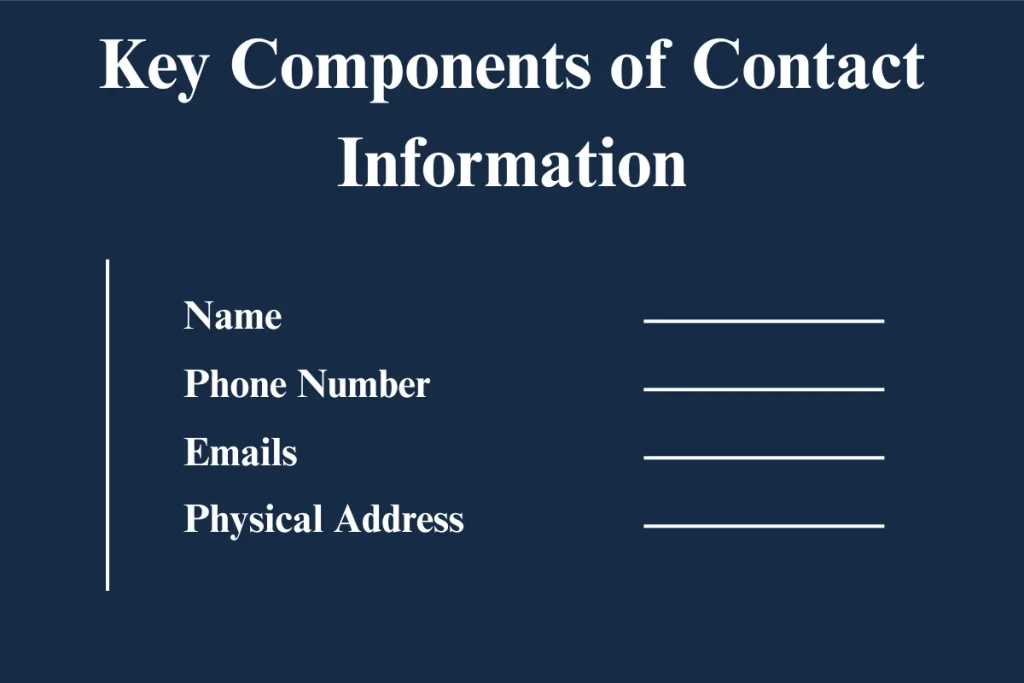
Contact information can be broken down into several key components, each serving its unique purpose in communication:
1. Name: The Essential Identifier
Your full name is the first piece of information required to make a connection. It is essential in both personal and business contexts. Name meaning is significant as it can include titles such as Mr., Mrs., or Dr. to offer more formal interaction details.
For instance, a resume will often begin with your name to allow potential employers or contacts to know who you are.
2. Phone Number: Reaching Out Directly
A valid and reachable phone number is crucial for direct communication. This is especially true in businesses where phone contact is sometimes the fastest and most reliable way to communicate.
Whether it’s a customer inquiry or a personal call, a phone number allows people to get in touch immediately. If you’ve ever looked up the meaning of contacts or the contact number meaning, you’ll know it’s often used to foster quick communication and prompt action.
3. Email Address: The Digital Communication Hub
In today’s digital world, an email address serves as the primary mode of communication for businesses and individuals alike. A professional email is essential, especially in business contexts, and helps maintain credibility.
Many companies provide email info on their website or include it in their business cards to ensure customers can reach them easily for customer support or inquiries.
4. Physical Address: Optional but Useful
Though optional, a physical address is crucial for certain applications. For businesses, it could be a physical location or the company’s head office.
It’s important to note that a physical address can sometimes be used as part of your company’s information when presenting information to customers, especially in local SEO strategies.
5. Social Media Links: Connecting Through Platforms
In today’s digital age, social media links are important, especially for businesses that want to be more approachable and available to their customers.
Links to platforms such as LinkedIn or X(Twitter) are becoming common in contact details, as they allow customers to connect on a more personal level.
Where to Find Contact Information
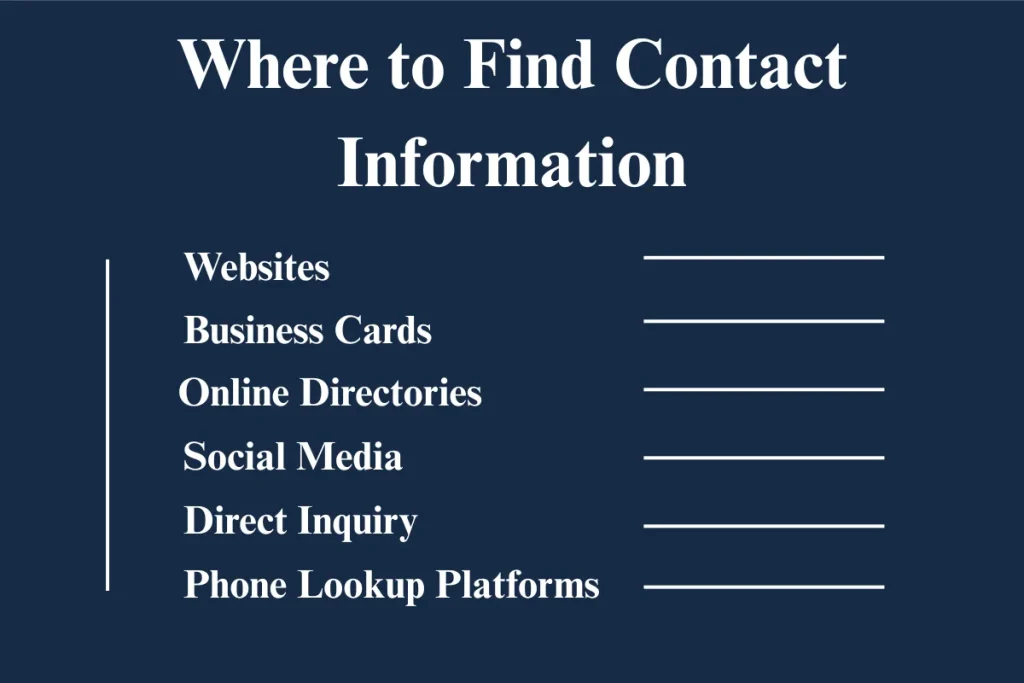
There are several places where contact information can be found, depending on the type of contact and the platform you are using.
1. On Websites and Contact Pages
The most common place for businesses to display contact information is on their website’s info page. Here, businesses often list phone numbers, email addresses, and even physical addresses. Additionally, website numbers or email info may appear in the footer or header for easy access.
2. Business Cards and Networking
For personal networking or quick exchanges, business info is often found on business cards. A business card is an essential tool in making professional connections and can be exchanged at events or meetings.
These cards typically include phone numbers, emails, and addresses, along with a website or social media link.
Many businesses store and exchange contact information digitally through APIs. This ensures a seamless process when syncing your data across different platforms. Consider how API integrations can enhance how your contact info is handled and shared.
3. Online Directories and Social Media
Many companies or individuals list their contact information on online directories or social media profiles. Websites like LinkedIn allow professionals to include their contact details, making it easier for others to reach out for collaboration, partnerships, or other business opportunities. Contacts on websites help businesses engage with their audience.
4. Phone Lookup Platforms
Specialized tools or phone lookup platforms can also be used to find someone’s contact number. These tools are particularly useful if you need to locate someone but don’t have their contact info readily available. Similarly, customer service numbers can be found via a quick online search or directory.
Maintaining accurate contact details involves data verification, ensuring that all the information you collect is correct and up to date. Learn more about how verifying your data can help improve communication and prevent errors.
How Contact Information Plays a Role in Digital Marketing and Sales
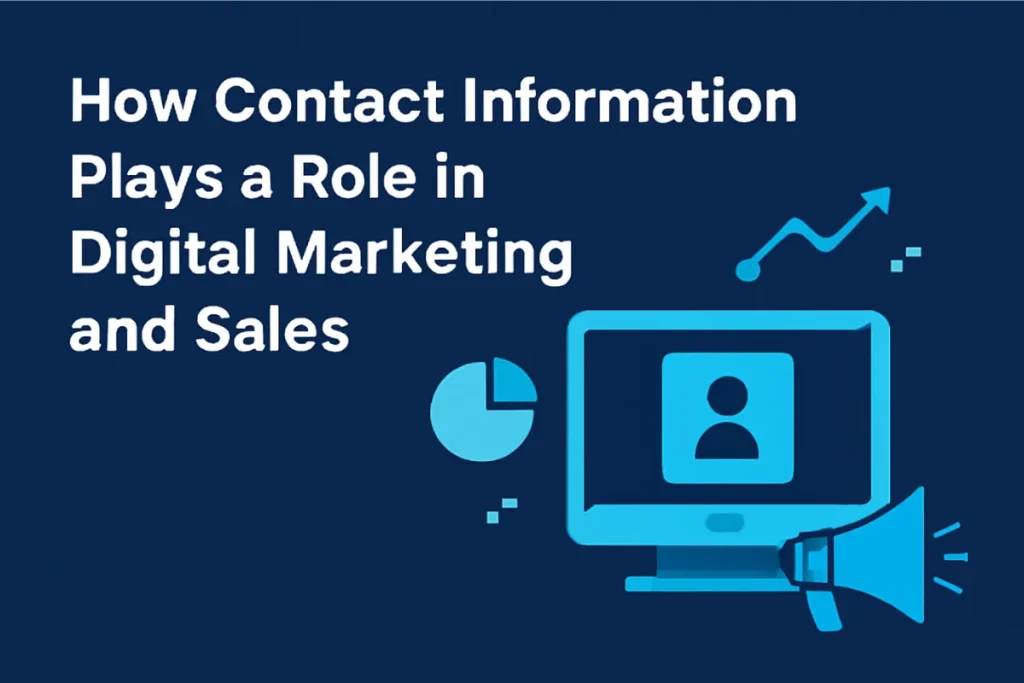
In the world of digital marketing and sales, contact information plays an essential role in connecting businesses with their customers. Here are a few ways in which contact information is crucial for online businesses:
1. Building Trust and Engagement
Clear and accurate contact information fosters trust between a company and its customers. By providing an accessible phone number or email, businesses signal transparency and openness to potential customers.
Whether it’s contacting us for more information or a quick response via email, having contact details available helps foster relationships.
For businesses involved in B2C commerce, having clear contact details is essential for customer engagement. Providing easy access to contact information can help improve your direct-to-consumer relationships, boosting trust and sales.
2. SEO and Contact Information
From an SEO perspective, having contact information available on your website is essential. Search engines like Google and Bing favor sites with clearly accessible contact details.
This allows them to index your site better and rank it higher, especially in local searches. Including company info, such as phone numbers and email addresses, improves your site’s SEO and increases visibility. Websites that list a physical address and offer an easy-to-find contact page will rank better in local searches.
3. Sales Lead Generation
Contact information is also critical for lead generation. For digital marketers, gathering accurate contact details through forms or call-to-action sections allows businesses to convert visitors into leads.
By offering an easy way to submit inquiries, businesses can ensure they don’t miss out on potential sales opportunities. Business details such as phone numbers or emails are vital for this process.
In digital marketing, managing contact information can enhance your channel marketing efforts. Understanding the ways to connect with customers through various channels is key for growth. Learn more about how different strategies in channel marketing can be leveraged to maximize your outreach.
Examples of Contact Information Usage
Personal Use: For individuals, a basic contact information setup typically includes an email address and phone number. These can be used for social events, professional networking, or job applications. For example, a resume usually only includes the name, phone number, and email.
Business Use: For companies, contact details need to be comprehensive, often including the company name, address, phone number, email, and a contact form on their website. This ensures that potential clients or customers can reach the business quickly and effectively.
Best Practices for Contact Information Management
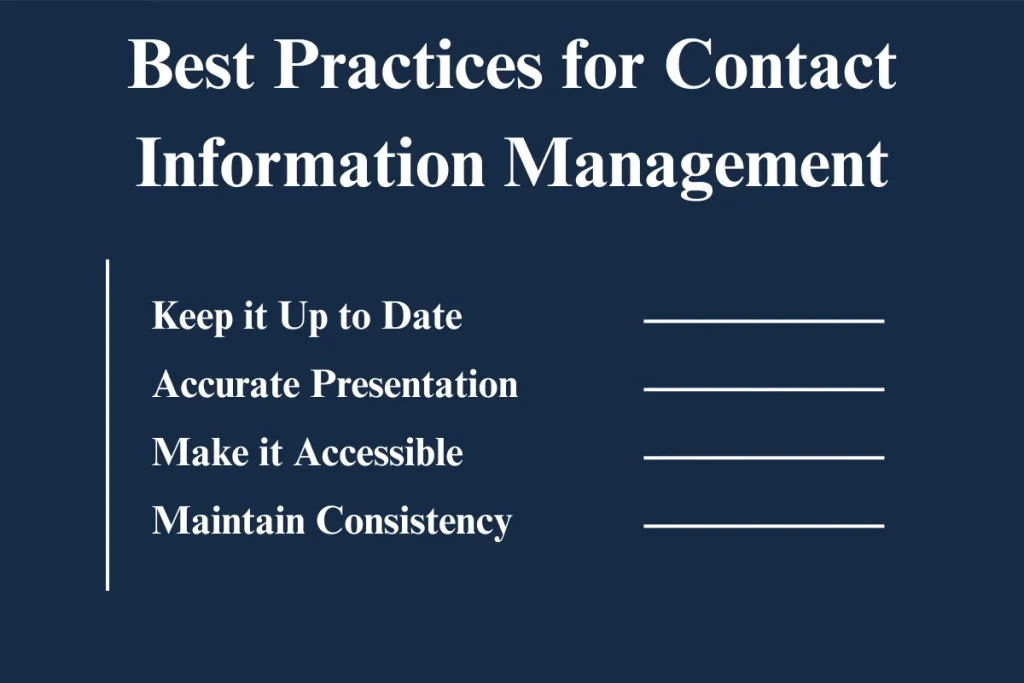
1. Clear and Accurate Presentation
When displaying contact information, it’s essential to format it. Use bold or italic text to make key details stand out, such as the phone number or email address. Ensure the layout is easy to navigate, whether on a business card, website, or online directory.
2. Keeping Contact Information Up-to-Date
Businesses should ensure that their contact information is always current. Outdated phone numbers or email addresses can lead to frustration and lost opportunities. Regularly check your contact page to ensure all details are accurate and functioning.
A site survey can help ensure your contact information is displayed and easily accessible across your website.
Conclusion
In conclusion, clear and accessible contact information is essential for effective communication, whether for personal use or business. By ensuring your contact details are accurate and easy to find, you can improve customer trust and engagement, ultimately fostering stronger relationships.
For businesses, properly managing and displaying contact information not only helps in customer communication but also plays a key role in digital marketing efforts. By making your contact details prominent, you enhance your online visibility and make it easier for customers to reach you when they need to.
FAQs
What should I put for contact information?
For personal use, include your name, phone number, and email address. For business purposes, you should add the company name, phone number, email, website, and potentially a physical address. If applicable, include social media links or a contact form for easier communication.
How do I retrieve my contact information?
You can retrieve your contact information by checking your phone, email accounts, business profiles, or websites. Many people store their contact details in digital directories or business cards, which can be easily accessed or updated.
What is contact person information?
Contact person information refers to the details of an individual who is responsible for communication within a business or organization. This typically includes their name, phone number, email address, and job title, allowing others to reach out to the right person for specific inquiries.





